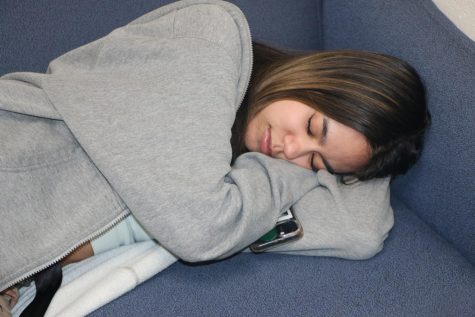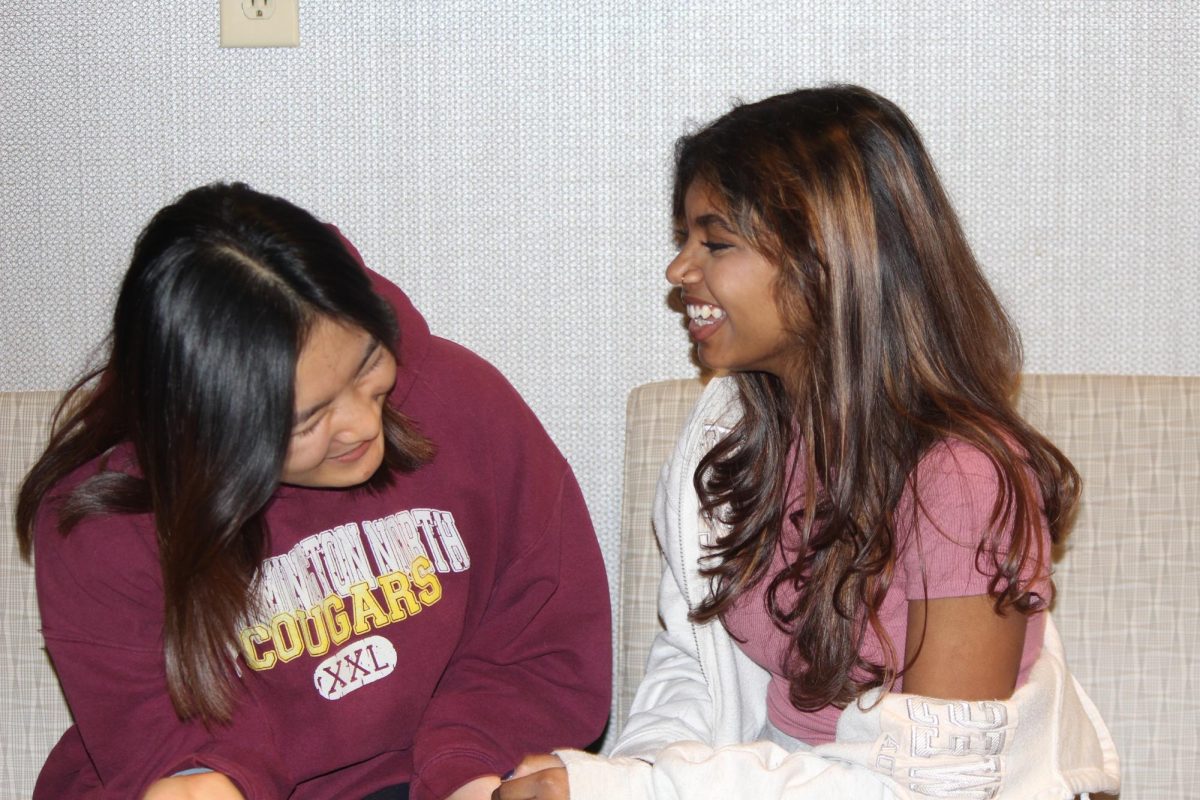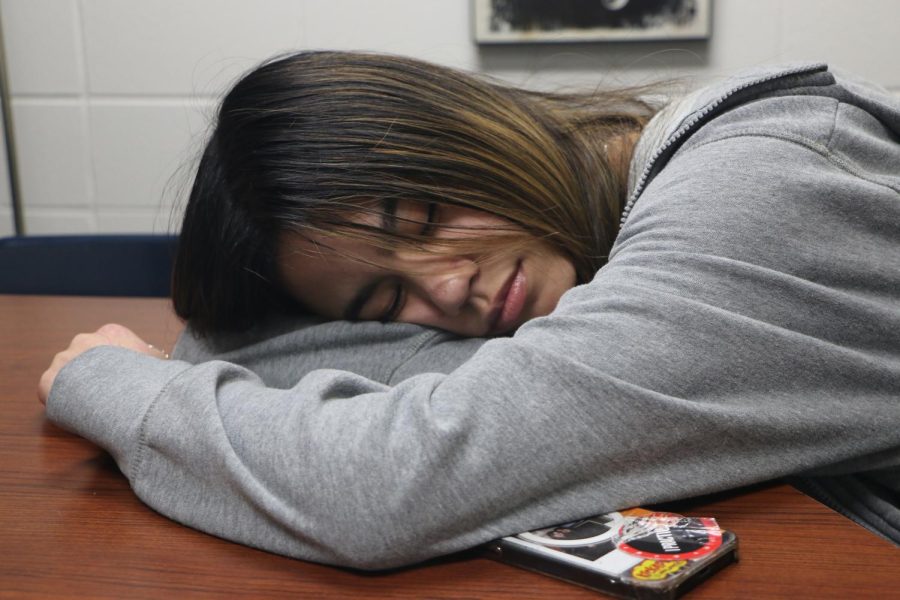According to Johns Hopkins Medicine, a teenager needs around 9 to 9.5 hours of sleep a night, but junior Pari Batra said she doesn’t get close to that amount.
“I get an average of four to five hours of sleep because of my workload,” Batra said. “Part of it is my fault since I procrastinate a lot and participate in many extracurricular activities that require time commitments.”
Batra is not alone. Senior Katherine Yu said not getting enough sleep affects her learning in school.
“It mainly reduces my focus and retention. For example, if I’m sleep deprived, I have trouble with basic math operations and I make a lot of careless mistakes. I also do not remember much from lectures if I don’t sleep much,” Yu said.
Adam Havice, health and wellness teacher, said not getting enough sleep does not only affect a student’s ability to learn.
“There is significant evidence that adolescents who get insufficient sleep are more likely to be overweight, not engage in daily physical activities, suffer from depressive symptoms, and have poor social and work relationships with others.”
Havice said that there is a wide variety of benefits a student can receive by meeting the recommended hours of sleep.
“Less likelihood of experiencing depressed moods, reduced likelihood for tardiness, reduced absenteeism, better grades, reduced risk of drowsy driving, and reduced risk of metabolic and nutritional deficits associated with insufficient sleep, including obesity,” Havice said.
Sophomore Abbygale “Abby” Karpinski said the amount of work that she receives is a big factor in how much sleep she gets at night.
“We have seven classes–not including SSRT–and the amount of work can really overwhelm you. Also, there are people (who) have extracurricular activities outside of school and that will just continue to add to your workload,” Karpinski said.

Batra is one of the people that Karpinski describes.
“Even though school ends at 4:05 p.m., I don’t get home until 5:45 or 6 p.m. on most days due to extracurriculars which can take homework time away. Some extracurriculars also require a lot of time commitment and work that you have to do outside of the meeting time which adds up to the workload,” Batra said. “The school start time is helpful, however, the school end time is so late and by the time I am done with all extracurriculars and everything, I cannot start homework until 7:15 on most nights which causes me to stay up later. In my personal opinion, I think that school should start around 7:30 a.m. and end around 2:30 p.m. because, after extracurriculars, everyone can be home around 4:30 p.m. and have more time to do homework.”
Yu said that the school’s later end time affects her as well.
“The later end times hurt my sleep,” she said. “When I get home it is already pretty late so I am less productive. Because I am less productive, I finish my work slower and end up going to bed later than I normally would.”
Karpinski said the school does offer a few resources to help students who are sleep deprived.
“I think SSRT is a huge resource for students who are sleep deprived during their classes and can go to their teachers and catch up on work. Also, you can go to the library and receive tutoring for any help you may need,” she said.
However, Yu said she has a different perspective on this.
“I don’t think the school provides good resources because I know a lot of other people who are also sleep-deprived,” Yu said. “And I haven’t really seen any help offered to students who are sleep deprived besides caffeine from the Carmel Cafe and Kick Starts in the vending machines. I think Carmel could improve by reducing the amount of busy work during class time so students have more time to work on homework during classes.”
However, Havice said while school start and end times and homework loads are out of their control, there are a few different methods students can use to combat sleep deprivation.
“Students should develop a bedtime routine that is doing the same things before going to bed each night, so they should try to go to bed and get up at the same time every day. Students should use stimulus control to get a good night’s sleep. This means using the bedroom only for sleeping, going to bed only when sleepy, get out of bed after 15 to 20 of wakefulness in the morning. Teens should avoid stimulants such as coffee, tea, soft drinks and energy drinks in the evening to promote better sleep.”
Click HERE to see a Just A Minute graphic about sleep.



















![Joseph Broman, Mu Alpha Theta sponsor, grades tests for his honors precalculus/trigonometry class. Broman said, “I’m retiring from the Math Club next year and I’m just going to do Mu Alpha Theta so I can focus on that one and we can do more [speaker series] first semester.”](https://hilite.org/wp-content/uploads/2024/03/IMG_9502-1200x900.jpg)











![British royalty are American celebrities [opinion]](https://hilite.org/wp-content/uploads/2024/03/Screenshot-2024-03-24-1.44.57-PM.png)




















![Review: “The Iron Claw” cannot get enough praise [MUSE]](https://hilite.org/wp-content/uploads/2024/04/unnamed.png)
![Review: “The Bear” sets an unbelievably high bar for future comedy shows [MUSE]](https://hilite.org/wp-content/uploads/2024/03/unnamed.png)
![Review: “Mysterious Lotus Casebook” is an amazing historical Chinese drama [MUSE]](https://hilite.org/wp-content/uploads/2024/03/0.webp)
![Thea Bendaly on her Instagram-run crochet shop [Biz Buzz]](https://hilite.org/wp-content/uploads/2024/03/IMG_0165-1200x838.jpg)
![Review: Sally Rooney’s “Normal People,” is the best book to read when you are in a time of change [MUSE]](https://hilite.org/wp-content/uploads/2024/03/20047217-low_res-normal-people.webp)
![Review in Print: Maripaz Villar brings a delightfully unique style to the world of WEBTOON [MUSE]](https://hilite.org/wp-content/uploads/2023/12/maripazcover-1200x960.jpg)
![Review: “The Sword of Kaigen” is a masterpiece [MUSE]](https://hilite.org/wp-content/uploads/2023/11/Screenshot-2023-11-26-201051.png)
![Review: Gateron Oil Kings, great linear switches, okay price [MUSE]](https://hilite.org/wp-content/uploads/2023/11/Screenshot-2023-11-26-200553.png)
![Review: “A Haunting in Venice” is a significant improvement from other Agatha Christie adaptations [MUSE]](https://hilite.org/wp-content/uploads/2023/11/e7ee2938a6d422669771bce6d8088521.jpg)
![Review: A Thanksgiving story from elementary school, still just as interesting [MUSE]](https://hilite.org/wp-content/uploads/2023/11/Screenshot-2023-11-26-195514-987x1200.png)
![Review: When I Fly Towards You, cute, uplifting youth drama [MUSE]](https://hilite.org/wp-content/uploads/2023/09/When-I-Fly-Towards-You-Chinese-drama.png)
![Postcards from Muse: Hawaii Travel Diary [MUSE]](https://hilite.org/wp-content/uploads/2023/09/My-project-1-1200x1200.jpg)
![Review: Ladybug & Cat Noir: The Movie, departure from original show [MUSE]](https://hilite.org/wp-content/uploads/2023/09/Ladybug__Cat_Noir_-_The_Movie_poster.jpg)
![Review in Print: Hidden Love is the cute, uplifting drama everyone needs [MUSE]](https://hilite.org/wp-content/uploads/2023/09/hiddenlovecover-e1693597208225-1030x1200.png)
![Review in Print: Heartstopper is the heartwarming queer romance we all need [MUSE]](https://hilite.org/wp-content/uploads/2023/08/museheartstoppercover-1200x654.png)























![Review: Ladybug & Cat Noir: The Movie, departure from original show [MUSE]](https://hilite.org/wp-content/uploads/2023/09/Ladybug__Cat_Noir_-_The_Movie_poster-221x300.jpg)

![Review: Next in Fashion season two survives changes, becomes a valuable pop culture artifact [MUSE]](https://hilite.org/wp-content/uploads/2023/03/Screen-Shot-2023-03-09-at-11.05.05-AM-300x214.png)
![Review: Is The Stormlight Archive worth it? [MUSE]](https://hilite.org/wp-content/uploads/2023/10/unnamed-1-184x300.png)



